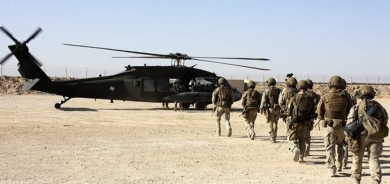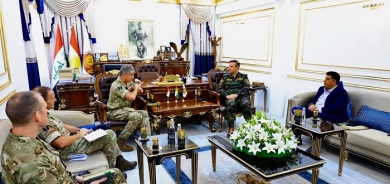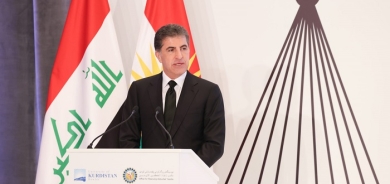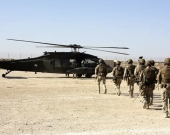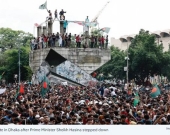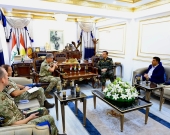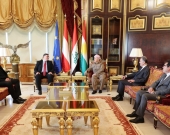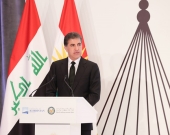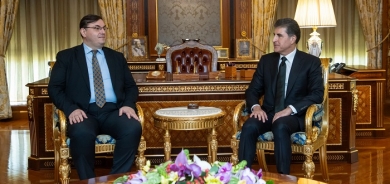U.S. Allies in Syria Cut Islamic State Supply Line

A quick and successful offensive by Kurdish fighters and allied rebels in a northern Syrian town has boosted a U.S.-backed effort to choke off Islamic State’s supply routes and offered a template for regaining territory from the extremist group.
Emboldened by the recapture of Tal Abyad, the Syrian Kurdish alliance said Tuesday that its next target is Raqqa, Islamic State’s main stronghold in Syria about 50 miles south of Tal Abyad. The fighters said they had already begun advancing southward toward Raqqa on Monday, reaching the town of Ain Issa, only about 30 miles away.
“We will move to liberate Raqqa in the near future,” said Shervan Darweesh, a spokesman for a coalition of rebel factions led by the Syrian Kurdish militia known as YPG.
Despite those proclamations, there is no broader military planning under way by the U.S.-led coalition for an imminent Raqqa offensive, which would be a much more ambitious endeavor than recapturing Tal Abyad.
The victory in Syria coincided with other successes this week in America’s global counterterrorism campaign. A Central Intelligence Agency drone strike in Yemen killed the No. 2 al Qaeda leader in the world, officials said Tuesday, and a U.S. military strike in Libya is believed to have killed another high-level al Qaeda militant.
On Tuesday, the yellow YPG flag fluttered at half-staff in Tal Abyad, visible from the Turkish town of Akçakale across the border, in commemoration of those killed in the fight against Islamic State. It replaced the extremist group’s black flag that had marked its control over the town for more than a year.
As Kurdish fighters and Syrian rebels cleared the town and its surrounding area of mines and booby-traps, many celebrated the victory that came after just three days of light fighting in the town and two weeks of concentrated U.S.-led airstrikes around it.
U.S. officials said it was a significant victory likely to isolate Raqqa for a time. Islamic State’s major supply line for foreign fighters and other supplies ran through Tal Abyad, which sits on the Turkish border. But they said they expect the extremist militants to try to open new supply lines to bring outside fighters into Syria.
U.S. officials have declined to specify the next steps for anti-Islamic State forces in Syria, whether in Raqqa or elsewhere.
The rout followed some important gains by Islamic State recently, including the capture of Palmyra in central Syria with its rich heritage of ancient ruins and of Ramadi, the capital of Iraq’s largest province. Forces fighting Islamic State forces have also had successes with the recapture of the Iraqi city of Tikrit. In the Iraqi city of Beiji, an important oil refining center, Islamic State has been facing a stiff challenge from Iraqi forces.
The U.S. had intensified its focus on Tal Abyad, working with the YPG forces, for more than two months. But according to a U.S. official, the coalition opted not to highlight the importance the U.S. or the Kurds were placing on it. About two weeks ago, Islamic State fighters realized they were losing ground and the Kurds were making headway. One U.S. official said that Islamic State, also known as ISIS and ISIL, tried to reinforce the town, but by then, it was too late.
“ISIL was focusing so much on Ramadi and Beiji they lost sight of the back door,” the official said. “It is a pretty significant victory.”
Edgar Vasquez, a spokesperson for the U.S. State Department’s Near Eastern Affairs Bureau, said: “Should anti-ISIL forces continue to hold the city, there is the potential for a significant disruption of ISIL’s flow of foreign fighters, illicit goods, and other illegal activity from Turkey into northern Syria and Iraq.”
Kurdish and allied fighters said their latest advance was aided by stepped-up U.S. airstrikes in the region around Raqqa. The U.S.-led coalition carried out 23 airstrikes near the city over the past two weeks, according to a tally of airstrikes reported by the U.S. military’s Central Command. That was more than double the number in the same area in all of May.
The Tal Abyad operation was part of a multipronged effort to cut off Islamic State’s supply lines, not just through Turkey to Raqqa but also across another Syrian border with Iraq. Reinforcements of fighters and arms from Syria have buoyed Islamic State forces in Iraq.
The Tal Abyad offensive mirrored the U.S.-backed battle earlier this year in the Syrian border city of Kobani, which was also driven by the YPG. Together, the two battles offer a template for the broader U.S.-led offensive against Islamic State in which Kurdish forces are primary partners on the ground.
“This is another illustration of the recipe for success that’s been documented in other places, including recently in Tikrit,” White House press secretary Josh Earnest said Tuesday. “And it is an indication that when our coalition can back capable, effective local fighters on the ground, that we can make important progress against ISIL.”
Officials acknowledge that their Islamic State strategy is working better in Kurdish areas—where 12,000 square miles have been retaken from extremists—than in Sunni-dominated areas like those in Iraq. In large measure, this is because Kurds are united against Islamic State militants, while Sunni tribes remain divided.
Officials with the U.S.-led coalition say they have coordinated closely with the Kurds in northern Syria through intelligence sharing and logistical support, as they have with the Kurdish Peshmerga forces in northern Iraq. But in Iraq, unlike Syria, the U.S. has advisers stationed in the country.
The battlefield gains consolidate the power of the YPG. The Syrian Kurds now control a contiguous 245-mile stretch of territory from Kobani east on the Syrian-Turkish border. In the assessment of U.S. officials, the only portion of the border still controlled by Islamic State is between Kobani and Aleppo.
Washington and Turkey remain at odds over how to tackle the Islamic State problem in Syria.
Across the border in Turkey, officials fear the success may fuel Kurdish separatism. The YPG is affiliated to the Kurdistan Workers’ Party, or PKK, in Turkey—the group that waged a three-decade insurgency against the Turkish state and is designated as a terror group by Ankara, Washington and the European Union.
“We did not join these bombardments like some other countries and for that, we have very valid reasons,” said Turkish deputy prime minister Bulent Arinc after a cabinet meeting on Monday.
Denise Natali, an expert on Kurdish affairs at the National Defense University in Washington, said the YPG is clearly an effective local force and reliable coalition partner on the ground—perhaps the most effective across Iraq and Syria.
“This situation in Syria is not dissimilar to what is occurring in Iraq: Kurdish territorial successes in expelling ISIS safe havens are emboldening Kurdish nationalist groups and stirring ethnic tensions,” Ms. Natali said. “But their successes will…stir deep concerns across the border in Turkey,” she added.
The YPG gains in northern Syria also raise concerns about more fragmentation there. For the U.S. and its allies, the YPG’s next moves—how fairly it shares local governance with Syrian rebel factions and restrains Kurds from attacking Arabs—is a bigger concern than its affiliation with the PKK.
The U.S. military said it was tracking closely complaints from the region that Arabs are being pushed out of areas they have traditionally lived in by the Kurdish offensive. Officials said they have seen no evidence of that so far.
Adnan al-Hussain, a former resident of a mostly Arab town west of Tal Abyad recently seized by the YPG, said Kurdish forces were trying to portray an image of inclusiveness that was false.
“Arabs will never accept a Kurdish state,” he said. “People are silent because Kurds are fighting ISIS now, but when ISIS leaves, Arabs from all over Syria will come to fight the Kurds.”
The Wall Street Journal


